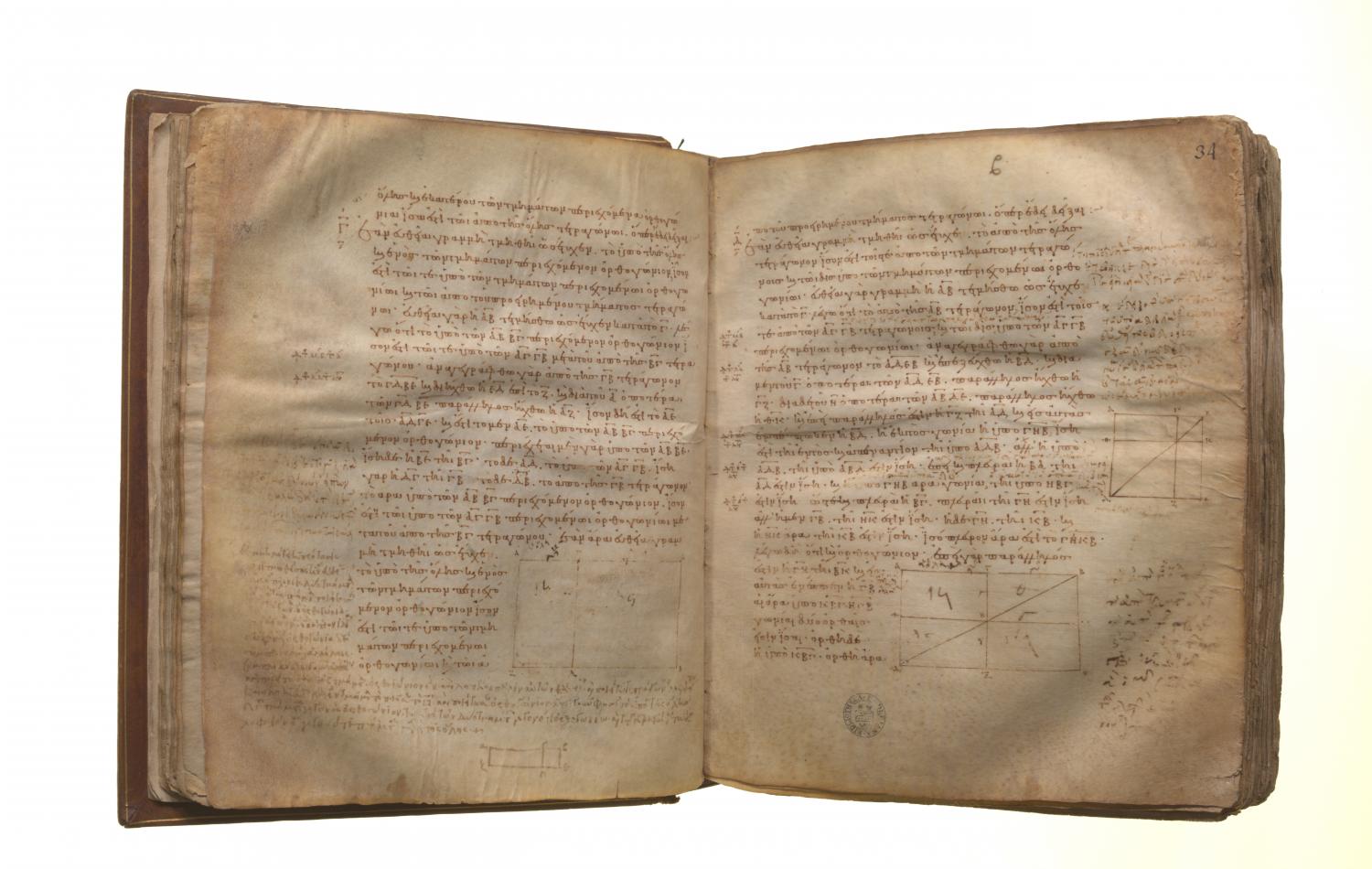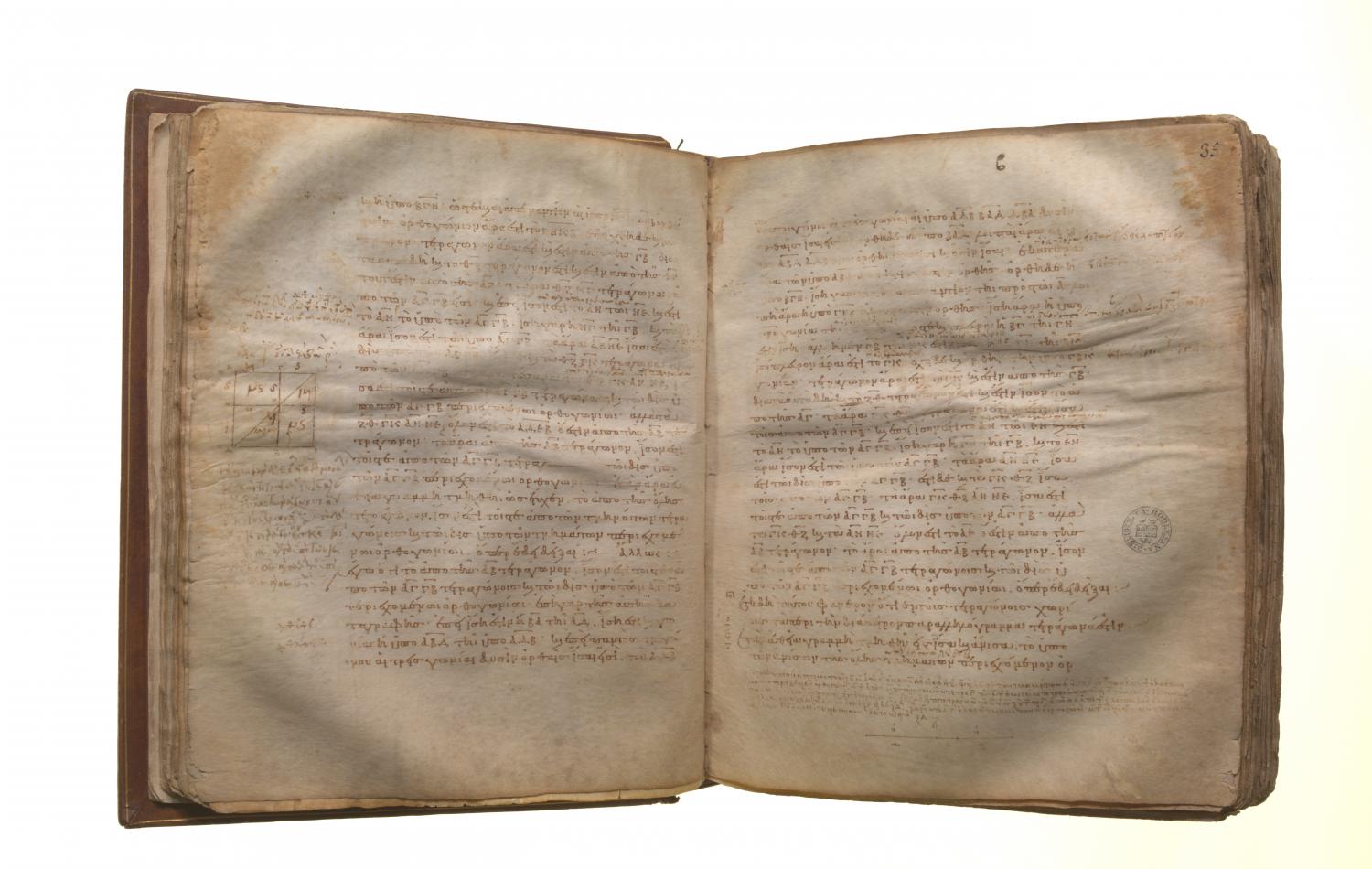Ἐὰν εὐθεῖα γραμμὴ τμηθῇ, ὡς ἔτυχεν, τὸ ἀπὸ τῆς ὅλης τετράγωνον ἴσον ἐστὶ τοῖς τε ἀπὸ τῶν τμημάτων τετραγώνοις καὶ τῷ δὶς ὑπὸ τῶν τμημάτων περιεχομένῳ ὀρθογωνίῳ. Εὐθεῖα γὰρ γραμμὴ ἡ ΑΒ τετμήσθω, ὡς ἔτυχεν, κατὰ τὸ Γ. λέγω, ὅτι τὸ ἀπὸ τῆς ΑΒ τετράγωνον ἴσον ἐστὶ τοῖς τε ἀπὸ τῶν ΑΓ, ΓΒ τετραγώνοις καὶ τῷ δὶς ὑπὸ τῶν ΑΓ, ΓΒ περιεχομένῳ ὀρθογωνίῳ. Ἀναγεγράφθω γὰρ ἀπὸ τῆς ΑΒ τετράγωνον τὸ ΑΔΕΒ, καὶ ἐπεζεύχθω ἡ ΒΔ, καὶ διὰ μὲν τοῦ Γ ὁποτέρᾳ τῶν ΑΔ, ΕΒ παράλληλος ἤχθω ἡ ΓΖ, διὰ δὲ τοῦ Η ὁποτέρᾳ τῶν ΑΒ, ΔΕ παράλληλος ἤχθω ἡ ΘΚ. καὶ ἐπεὶ παράλληλός ἐστιν ἡ ΓΖ τῇ ΑΔ, καὶ εἰς αὐτὰς ἐμπέπτωκεν ἡ ΒΔ, ἡ ἐκτὸς γωνία ἡ ὑπὸ ΓΗΒ ἴση ἐστὶ τῇ ἐντὸς καὶ ἀπεναντίον τῇ ὑπὸ ΑΔΒ. ἀλλ' ἡ ὑπὸ ΑΔΒ τῇ ὑπὸ ΑΒΔ ἐστιν ἴση, ἐπεὶ καὶ πλευρὰ ἡ ΒΑ τῇ ΑΔ ἐστιν ἴση: καὶ ἡ ὑπὸ ΓΗΒ ἄρα γωνία τῇ ὑπὸ ΗΒΓ ἐστιν ἴση: ὥστε καὶ πλευρὰ ἡ ΒΓ πλευρᾷ τῇ ΓΗ ἐστιν ἴση: ἀλλ' ἡ μὲν ΓΒ τῇ ΗΚ ἐστιν ἴση, ἡ δὲ ΓΗ τῇ ΚΒ: καὶ ἡ ΗΚ ἄρα τῇ ΚΒ ἐστιν ἴση: ἰσόπλευρον ἄρα ἐστὶ τὸ ΓΗΚΒ. λέγω δή, ὅτι καὶ ὀρθογώνιον. ἐπεὶ γὰρ παράλληλός ἐστιν ἡ ΓΗ τῇ ΒΚ [καὶ εἰς αὐτὰς ἐμπέπτωκεν εὐθεῖα ἡ ΓΒ], αἱ ἄρα ὑπὸ ΚΒΓ, ΗΓΒ γωνίαι δύο ὀρθαῖς εἰσιν ἴσαι. ὀρθὴ δὲ ἡ ὑπὸ ΚΒΓ: ὀρθὴ ἄρα καὶ ἡ ὑπὸ ΒΓΗ: ὥστε καὶ αἱ ἀπεναντίον αἱ ὑπὸ ΓΗΚ, ΗΚΒ ὀρθαί εἰσιν. ὀρθογώνιον ἄρα ἐστὶ τὸ ΓΗΚΒ: ἐδείχθη δὲ καὶ ἰσόπλευρον: τετράγωνον ἄρα ἐστίν: καί ἐστιν ἀπὸ τῆς ΓΒ. διὰ τὰ αὐτὰ δὴ καὶ τὸ ΘΖ τετράγωνόν ἐστιν: καί ἐστιν ἀπὸ τῆς ΘΗ, τουτέστιν [ἀπὸ] τῆς ΑΓ: τὰ ἄρα ΘΖ, ΚΓ τετράγωνα ἀπὸ τῶν ΑΓ, ΓΒ εἰσιν. καὶ ἐπεὶ ἴσον ἐστὶ τὸ ΑΗ τῷ ΗΕ, καί ἐστι τὸ ΑΗ τὸ ὑπὸ τῶν ΑΓ, ΓΒ: ἴση γὰρ ἡ ΗΓ τῇ ΓΒ: καὶ τὸ ΗΕ ἄρα ἴσον ἐστὶ τῷ ὑπὸ ΑΓ, ΓΒ: τὰ ἄρα ΑΗ, ΗΕ ἴσα ἐστὶ τῷ δὶς ὑπὸ τῶν ΑΓ, ΓΒ. ἔστι δὲ καὶ τὰ ΘΖ, ΓΚ τετράγωνα ἀπὸ τῶν ΑΓ, ΓΒ: τὰ ἄρα τέσσαρα τὰ ΘΖ, ΓΚ, ΑΗ, ΗΕ ἴσα ἐστὶ τοῖς τε ἀπὸ τῶν ΑΓ, ΓΒ τετραγώνοις καὶ τῷ δὶς ὑπὸ τῶν ΑΓ, ΓΒ περιεχομένῳ ὀρθογωνίῳ. ἀλλὰ τὰ ΘΖ, ΓΚ, ΑΗ, ΗΕ ὅλον ἐστὶ τὸ ΑΔΕΒ, ὅ ἐστιν ἀπὸ τῆς ΑΒ τετράγωνον: τὸ ἄρα ἀπὸ τῆς ΑΒ τετράγωνον ἴσον ἐστὶ τοῖς τε ἀπὸ τῶν ΑΓ, ΓΒ τετραγώνοις καὶ τῷ δὶς ὑπὸ τῶν ΑΓ, ΓΒ περιεχομένῳ ὀρθογωνίῳ. Ἐὰν ἄρα εὐθεῖα γραμμὴ τμηθῇ, ὡς ἔτυχεν, τὸ ἀπὸ τῆς ὅλης τετράγωνον ἴσον ἐστὶ τοῖς τε ἀπὸ τῶν τμημάτων τετραγώνοις καὶ τῷ δὶς ὑπὸ τῶν τμημάτων περιεχομένῳ ὀρθογωνίῳ: ὅπερ ἔδει δεῖξαι.[Πόρισμα. Ἐκ δὴ τούτου φανερόν, ὅτι ἐν τοῖς τετραγώνοις χωρίοις τὰ περὶ τὴν διάμετρον παραλληλόγραμμα τετράγωνά ἐστιν.]
If a straight line be cut at random, the square on the whole is equal to the squares on the segments and twice the rectangle contained by the segments. For let the straight line AB be cut at random at C; I say that the square on AB is equal to the squares on AC, CB and twice the rectangle contained by AC, CB. For let the square ADEB be described on AB, [I. 46] let BD be joined; through C let CF be drawn parallel to either AD or EB, and through G let HK be drawn parallel to either AB or DE. [I. 31] Then, since CF is parallel to AD, and BD has fallen on them, the exterior angle CGB is equal to the interior and opposite angle ADB. [I. 29] But the angle ADB is equal to the angle ABD, since the side BA is also equal to AD; [I. 5] therefore the angle CGB is also equal to the angle GBC, so that the side BC is also equal to the side CG. [I. 6] But CB is equal to GK, and CG to KB; [I. 34] therefore GK is also equal to KB; therefore CGKB is equilateral. I say next that it is also right-angled. For, since CG is parallel to BK, the angles KBC, GCB are equal to two right angles. [I. 29] But the angle KBC is right; therefore the angle BCG is also right, so that the opposite angles CGK, GKB are also right. [I. 34] Therefore CGKB is right-angled; and it was also proved equilateral; therefore it is a square; and it is described on CB. For the same reason HF is also a square; and it is described on HG, that is AC. [I. 34] Therefore the squares HF, KC are the squares on AC, CB. Now, since AG is equal to GE, and AG is the rectangle AC, CB, for GC is equal to CB, therefore GE is also equal to the rectangle AC, CB. Therefore AG, GE are equal to twice the rectangle AC, CB. But the squares HF, CK are also the squares on AC, CB; therefore the four areas HF, CK, AG, GE are equal to the squares on AC, CB and twice the rectangle contained by AC, CB. But HF, CK, AG, GE are the whole ADEB, which is the square on AB. Therefore the square on AB is equal to the squares on AC, CB and twice the rectangle contained by AC, CB.[Porism. From this it is manifest that in square areas the parallelograms about the diameter are squares.]

